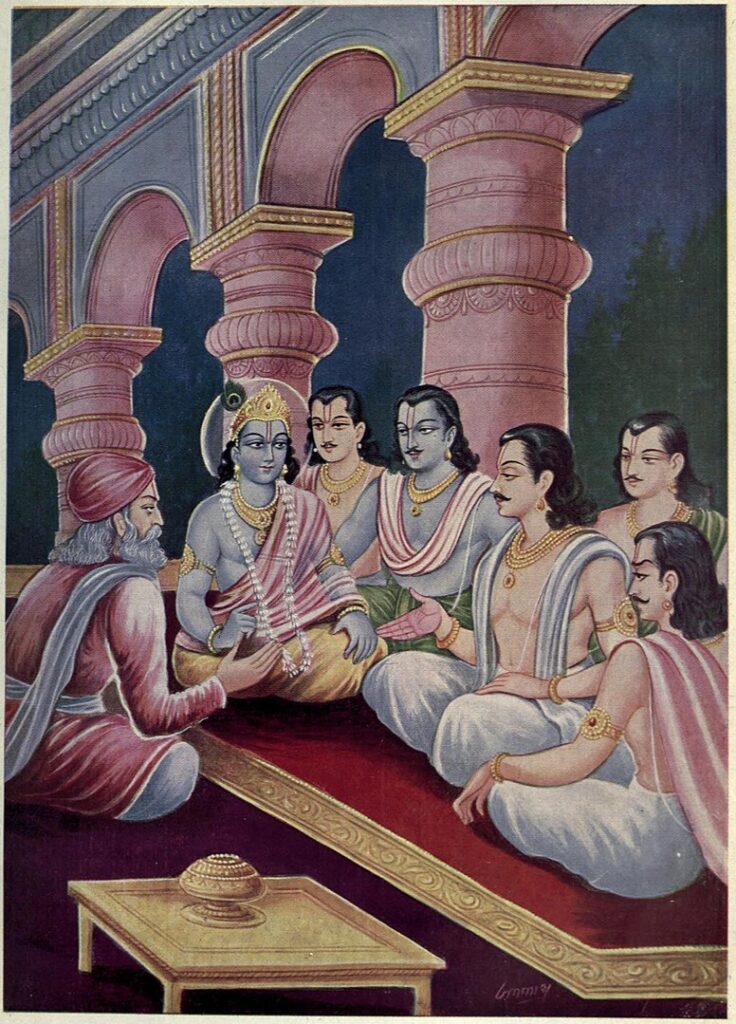A Summary of the Udyoga Parva

Note: The 5th parva, which is known as the Udyoga Parva, contains Krishna’s efforts to make peace between the Pandavas and the Kauravas. However, the peace efforts were unsuccessful, therefore this parva also contains details of the battle preparations.
The Udyoga Parva is made up of 6698 shlokas (verses) divided into 186 sections.
Following is an outline of the events that are described in the Udyoga Parva.
The Udyoga Parva begins with the incident of Duryodhana and Arjuna approaching Krishna for help at the same time. Upon being given two options, Arjuna selected Sri Krishna as a counselor who would not participate in the battle, while Duryodhana selected Krishna’s army of one akshauhini.
Next in this parva, we see that Salya, the king of Madra, had decided to support the Pandavas. However, Duryodhana intercepted Salya when he was on his way to the Pandavas camp. Duryodhana pleased the monarch with lavish gifts, respect, and hospitality, and won King Salya over to his side.
The incident of the Pandavas sending their purohit (priest) with a message for the Kauravas is also described in this parva.
The Pandavas’ purohit narrated a story of Indra’s victory to the Kauravas. After hearing the story, King Dhritarashtra also decided to send his purohit with a message to the Pandavas, however, ultimately, he sent Sanjaya with a message of peace.
Also described in this parva, is Dhritarashtra’s anxiety and sleeplessness after hearing several things about the Pandavas, their friends, Krishna, and others.
It was on this occasion that Vidura addressed King Dhritarashtra with words full of spiritual philosophy and wisdom. The contents of Vidura’s speech are popularly known as Vidura Niti.
Meanwhile, Sanjaya returned from the Pandavas’ camp the next morning and spoke about the true identity of Krishna and Arjuna to Dhritharasthta. At the same time, the illustrious Krishna was also moved by compassion and went to Hastinapura in a final bid to make peace.
Prince Duryodhana, however, rejected Krishna’s offer of peace. This episode of the Udyoga Parva, mentions several other stories like those of Damvodvava, the story of Matuli’s search for a husband for his daughter, the history of Sage Galava, and finally, the story of the training and discipline of the son of Bidula.
Krishna exhibits his yogic powers to the assembly of kings in the Kaurava court. He also advises Karna to seek peace rather than war.
Despite his efforts, Krishna was not able to bring peace to the situation. Therefore, he returned to Upaplavya to the Pandavas’ camp and narrated all the incidents, that had occurred in Hastinapur, to them. After listening to Krishna, the Pandavas started preparing for war.
Next, we read about troops from both sides marching toward the battlefield.
On the day before the battle, Duryodhana sent a messenger, Uluka, to the Pandavas. The words of this messenger served to further anger the Pandavas.
This parva describes charioteers of different classes based on their level of skill.
The story of Amba is also recited in this parva.
Previous: A Summary of the Virata Parva

Nicely explained, Parag.
If I may ask, what was the message sent through Uluka? Why did it anger the Pandavas?
Thank you Chandra!
Duryodhana send Uluka (Shakuni’s son) to the Pandavas, a day before the war, with a message full of mockery.
1. He called Yudhishthira a hypocrite because Yudhishthhira had always spoken about the Dharma, and yet, he was ready to sacrifice so many lives to sit on the throne of Hastinapura.
2. He also called Yudhishthira a coward because of the peace-making messages that Krishna had conveyed to the Kauravas on behalf of the Pandavas.
3. He called Yudhishthira an ‘abject’ person because he had asked for a meager 5 villages when all the peace efforts failed.
4. After that he insulted all the Pandavas for the roles they had played during the year of hiding.
5. He mocked the Pandavas’ lack of bravery for trying to make peace instead of war, the way they had caused their wife, Draupadi, to live in the forest, and several other insulting words.